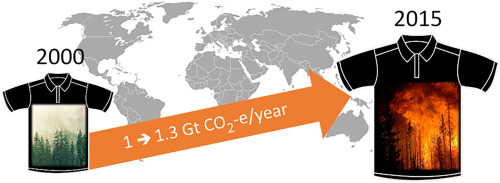
“THE PROTECTION WE WEAR; IS LEAVING US IN TEARS”
The textile industry, often lauded for its role in shaping fashion and clothing, conceals a sinister underbelly that has far-reaching consequences for our planet and our well-being. While we may revel in the latest fashion trends and the comfort of our clothing, it’s time to unveil the dark side of this massive industry and question whether it’s silently causing harm on a global scale.
The textile industry, driven by the demand for fast fashion and rapid consumption, has fueled an alarming increase in textile waste. Inexpensive, disposable clothing often ends up in landfills, where it decomposes and releases harmful pollutants into the environment, polluting the air, soil, and water.
Water, a finite resource, is ruthlessly consumed in the textile manufacturing process. The dyeing and finishing stages, in particular, require immense quantities of water, which are then discharged into water bodies, laden with toxic chemicals and heavy metals. This pollutes aquatic ecosystems and poses a severe threat to the planet’s fragile balance.
Beyond water consumption, the textile industry is a voracious consumer of natural resources, including land and energy. Unsustainable practices have accelerated resource depletion, exacerbating climate change and ecological instability.
The chemicals used in textile manufacturing pose a grave threat to human health. Factory workers, as well as consumers, are exposed to these toxins, which can lead to a range of health problems. Skin irritations, respiratory ailments, and long-term health issues are common side effects of chemical exposure in the industry.
But the harm doesn’t stop there. Synthetic textiles, prevalent in the industry, shed microplastic particles when washed. These microplastics make their way into our water supply, eventually entering the food chain. Consuming these minuscule plastic particles may have dire health consequences, including potential toxicity.
In addition to chemical exposure, the industry’s reliance on cheap labor in developing countries perpetuates poor working conditions, low wages, and a lack of safety measures. This not only endangers the health of the workforce but also their overall quality of life.
The textile industry grapples with deep-rooted ethical concerns. Despite efforts to eradicate child labor and improve working conditions, child exploitation still exists in some regions, and many textile workers endure grueling conditions, low pay, and the absence of essential safety measures.
Moreover, the industry’s race to produce low-cost clothing has fostered a culture of disposable fashion, which is ethically unsustainable. This relentless pursuit of profit over ethics has raised questions about fair trade, labor rights, and the well-being of the people who make our clothing.
The textile industry’s impact on our world is undeniable, and it extends far beyond the realm of fashion and style. It has been a silent accomplice in environmental degradation, health risks, and ethical dilemmas. The clothes we wear have a hidden cost, one that affects our planet and the people on it.
But as consumers, we hold the power to steer change. By supporting sustainable and ethical fashion brands, reducing textile waste, and advocating for responsible industry practices, we can work toward a more sustainable and ethical future. The next time you don your stylish outfit, remember the unseen consequences of your choices and consider the textile industry’s role in shaping our world.
